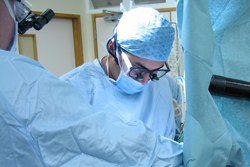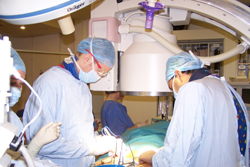Vascular Studies Unit |
B56
|
Carotid or Rapid Access Stroke Surgery

The carotid artery in the neck provides the principal blood supply to the brain.
The artery (common carotid artery) runs up the side of the neck and divides into two branches just below the angle of the jaw. One branch supplies the face (external carotid artery). The other branch passes directly to the brain and eyes with no other branches in the neck (internal carotid artery).
If this artery gets narrowed (furred up) patients can have a Trans Ischemic Attack (TIA) or mini stroke which can manifest itself as temporary blindness or can affect the face, arm or leg on one side of the body. Up to 25% of strokes are caused by carotid disease.
The RUH has a rapid access TIA clinic where patients with these kinds of symptoms get seen within 48 hours of referral and who receive a comprehensive set of tests to establish their stroke risk.
An ultrasound scan can establish whether the TIA symptoms are associated with a narrowing of the artery to the brain. If this narrowing is very tight, there is a high risk of major stroke. The risk of stroke is greatest during the first 6 months after the TIA.
In these cases carotid surgery is offered. The aim of treatment is to reduce the risk of major stroke posed by the tight narrowing in the neck. The risk of major stroke is reduced from approximately 1 in 3 to 1 in 25.
The operation

Carotid endarterectomy is a well established operation to unblock the narrowed carotid artery. The artery is carefully exposed through an incision running vertically in the side of the neck.
The artery is opened, cleared of the debris and carefully sewn up again. The operation is done under local anaesthetic and takes about one and half hours. The surgery reduces the threat of stroke from about 1 in 5 to 1 in 25.
The principal risk is that a small number of people (between 1 and 3 in 100) having the procedure will have a stroke during the operation. Otherwise, there are few side effects.
If you require this surgery, it will take place at Southmead Hospital (part of the North Bristol NHS Trust).

